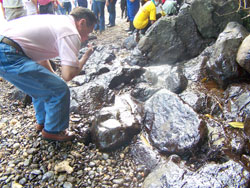Health exec allays fears of Guimaras residents over rising oil spill-related cases

Health Sec. Francisco Duque III personally checks
on the smell of bunker oil collected in big rocks
along the shoreline of Nueva Valencia, Guimaras.
Health Secretary Francisco Duque III called on the people of Guimaras, particularly those residing in barangays affected by the oil spill, to remain calm amid the continued increase in the number of oil spill-related health cases recorded by local health officials.
The Department of Health in a report to the Regional Disaster Coordinating Council (RDCC) recorded a total of 329 cases of respiratory problems, dizziness, diarrhea, contact dermatitis, cough, and asthma as of August 24, 2006. Said illnesses are presumed to be related to the fumes coming from the oil sludge.
Duque also dispelled reports that the oil spill caused the death of one person in Barangay Cabalagnan, Nueva Valencia.
Duque along with Department of Social Welfare and Development Secretary Teresita Cabral were in Iloilo Thursday to conduct a site visit on the affected areas. The two were part of the Task Force Guimaras created by President Gloria Macapagal-Arroyo.
The national task force is chaired by National Disaster Coordinating Chair Avelino Cruz. The other members of the task force are Transportation Secretary Leandro Mendoza, Environment Secretary Angelo Reyes and Philippine Coast Guard Vice Admiral Arthur Gosingan.
Duque said the health department is continuously monitoring the situation of the people, especially in areas worst hit by the oil spill. He said they will deploy 66 health personnel to take care of the health of the affected residents. There are also toxicologists from the National Poison Prevention Center and engineers to handle the occupational aspect of the affected residents.
Duque also protested the reports blaming the oil-spill on the death of one resident in Barangay Cabalagnan, Nueva Valencia. It is not likely to be the cause of the death, there are other things to be considered, he said.
He said they could not directly attribute the death of the person on the toxic fumes. The person has hypertension. There are things to be considered such as the alcohol toxicity and the toxic fumes probably inhaled by the victim.
Duque said the case is "isolated." There are other persons who were exposed to the same environment and yet did not die because of the fumes coming from the industrial fuel oil.
Nevertheless, Duque said the residents should be careful as he cited some signs which are related to inhalation of fumes coming from the bunker fuel. The health hazard signs are dizziness and cough. The people who have prolonged contact with the bunker fuel may suffer contact dermatitis and irritant dermatitis.
He added that they are giving advisories to the people to protect them from whatever illnesses that may crop up because of the oil spill. They are also checking on the water supply of the residents.
The health advisory from the Department of Health, says that oil spill endanger public health, imperil drinking water and affect the natural resources. Oil is petroleum in liquid that contains highly volatile compounds and potentially affect the health of the people via inhalation, ingestion and skin absorption.
The prolonged contact to the industrial fuel oil can cause reddening, edema, and burning; skin effects maybe worsen by subsequent exposure to ultraviolet light from the sun, repeated exposure may result in dermatitis, irritation of the eyes and nose; may result to inflammation of the upper respiratory tract and chemical pneumonitis, acute inhalation poisoning that may lead to euphoria, vertigo, headache and chest pain and prolong exposure may affect the central nervous system.
The workers and the residents who have close contact with the petroleum product are advised to wear protective gear like gowns, gloves, boots and goggles. They are also instructed to dispose off outer boots and gloves and washed oiled clothing and goggles after each clean up operation.
